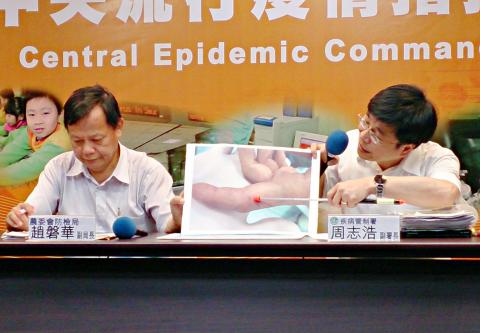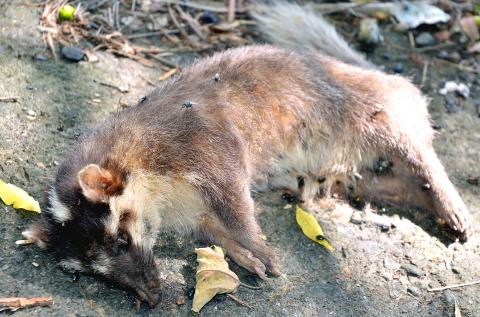The first case of a person being bitten by a wild Formosan ferret-badger infected with rabies was confirmed in Taitung County’s Donghe Township (東河) on Tuesday night, the Council of Agriculture said.
The incident came in the wake of the council’s announcement last week that three cases of rabies infection were found in dead wild ferret-badgers in Yunlin County’s Gukeng (古坑) and Nantou County’s Yuchi (魚池) and Lugu (鹿谷) last year, causing Taiwan to fall off the list of rabies-free countries after 54 years.
According to the council, a 31-year-old man surnamed Huang (黃) of Donghe’s Singchang Village (興昌) was bitten by a wild ferret-badger at home on Monday night. He reported the case to the local animal disease control center on Tuesday and was sent to the Hualien Hospital for emergency precautionary treatment consisting of intravenous injections of immunoglobulin and rabies vaccine.

Photo: CNA
Centers for Disease Control (CDC) Deputy Director-General Chou Jih-haw (周志浩) said while initial testing found no signs of the virus having infected Huang, the center will continue to monitor his health for a month and administer the necessary five vaccine shots in this period.
Chang Su-san (張淑賢), director of the council’s Bureau of Animal and Plant Health Inspection and Quarantine, said Huang felt an animal climbing onto his neck when he was working on a computer at home at about 7pm on Monday and was bitten on the finger by the animal when he tried to chase it away.
“He had the presence of mind to capture the ferret-badger in a rat cage and the animal was found dead on Tuesday morning,” Chang said.

Photo: CNA
“Huang reported the case to the local animal disease control center at about 9am on Tuesday. The center immediately reported the case and sent the dead animal to the council’s Animal Health Research Institute for testing,” he added.
Having conducted a fluorescent antibody test, as recommended by the World Organisation for Animal Health (OIE), the dead animal was confirmed to be infected with rabies at about 7pm on Tuesday night,” Chang said.
According to Tsai Hsiang-jung (蔡向榮), director-general of the council’s Animal Health Research Institute, the DNA of the virus found in the rabies-infected ferret-badger is close in structure to the rabies virus found in southern China.
Tsai said the conclusion was based on DNA sequencing data for rabies posted on the Web site of the US’ government-funded National Center for Biotechnology Information.
“The possibility that the ferret-badger was bitten by a wild animal from China that was smuggled into Taiwan and released into the wild cannot be ruled out,” he said.
An official with the Bureau of Animal and Plant Health Inspection and Quarantine said the bureau would send an official to China to learn more about its rabies situation.
Meanwhile, Council of Agriculture Minister Chen Bao-ji (陳保基) said the council has gathered specialists at animal disease prevention centers to conduct epidemiological research to better understand the outbreak and the source of the infection.
“We also urge the public not to take their pets to forest recreation areas or into the mountains, to prevent pets chasing wild animals and running the risk of getting infected with rabies,” he said.
The CDC said it has established a rabies prevention work group at the council. They agreed in their first meeting yesterday to give free vaccines and immunoglobulin inoculations to people with high-risk exposure to the virus and to increase the number of inoculation centers from 15 hospitals to 25 hospitals.
People working with animals who wish to get precautionary vaccines and inoculations will be informed by the council according to their exposure risk as soon as it has sufficient vaccines, it said, adding that any animal that is suspected of having rabies should be reported to the relevant local authority.
Taitung County officials said more than 10 cases of sudden Formosan ferret-badger deaths have been reported in Singchang Village in the past few days. County officials in charge of animal health visited the village yesterday to help vaccinate villagers’ pets.
Singchang Village Warden Lin Hsien-shen (林憲身) said he was also concerned that villagers may have eaten more ferret-badgers recently because they have been easier to catch.
Lin said residents of Singchang, where at least half the population are Aborigines, hunt the animal for food.
The Council of Indigenous Peoples said it plans to launch an information blitz in conjunction with other agencies to educate villagers in these regions on animal health and urge them not to eat ferret-badgers.
Chou Chin-cheng (周晉澄), dean of National Taiwan University’s School of Veterinary Medicine, said people cannot be infected if a ferret-badger with rabies is well-cooked, but they would be vulnerable if they have surface wounds while preparing the animal for cooking.

ENDEAVOR MANTA: The ship is programmed to automatically return to its designated home port and would self-destruct if seized by another party The Endeavor Manta, Taiwan’s first military-specification uncrewed surface vehicle (USV) tailor-made to operate in the Taiwan Strait in a bid to bolster the nation’s asymmetric combat capabilities made its first appearance at Kaohsiung’s Singda Harbor yesterday. Taking inspiration from Ukraine’s navy, which is using USVs to force Russia’s Black Sea fleet to take shelter within its own ports, CSBC Taiwan (台灣國際造船) established a research and development unit on USVs last year, CSBC chairman Huang Cheng-hung (黃正弘) said. With the exception of the satellite guidance system and the outboard motors — which were purchased from foreign companies that were not affiliated with Chinese-funded

PERMIT REVOKED: The influencer at a news conference said the National Immigration Agency was infringing on human rights and persecuting Chinese spouses Chinese influencer “Yaya in Taiwan” (亞亞在台灣) yesterday evening voluntarily left Taiwan, despite saying yesterday morning that she had “no intention” of leaving after her residence permit was revoked over her comments on Taiwan being “unified” with China by military force. The Ministry of the Interior yesterday had said that it could forcibly deport the influencer at midnight, but was considering taking a more flexible approach and beginning procedures this morning. The influencer, whose given name is Liu Zhenya (劉振亞), departed on a 8:45pm flight from Taipei International Airport (Songshan airport) to Fuzhou, China. Liu held a news conference at the airport at 7pm,

Taiwan was ranked the fourth-safest country in the world with a score of 82.9, trailing only Andorra, the United Arab Emirates and Qatar in Numbeo’s Safety Index by Country report. Taiwan’s score improved by 0.1 points compared with last year’s mid-year report, which had Taiwan fourth with a score of 82.8. However, both scores were lower than in last year’s first review, when Taiwan scored 83.3, and are a long way from when Taiwan was named the second-safest country in the world in 2021, scoring 84.8. Taiwan ranked higher than Singapore in ninth with a score of 77.4 and Japan in 10th with

GRIDLOCK: The National Fire Agency’s Special Search and Rescue team is on standby to travel to the countries to help out with the rescue effort A powerful earthquake rocked Myanmar and neighboring Thailand yesterday, killing at least three people in Bangkok and burying dozens when a high-rise building under construction collapsed. Footage shared on social media from Myanmar’s second-largest city showed widespread destruction, raising fears that many were trapped under the rubble or killed. The magnitude 7.7 earthquake, with an epicenter near Mandalay in Myanmar, struck at midday and was followed by a strong magnitude 6.4 aftershock. The extent of death, injury and destruction — especially in Myanmar, which is embroiled in a civil war and where information is tightly controlled at the best of times —